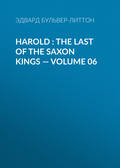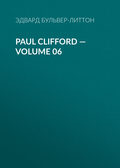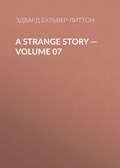
Эдвард Бульвер-Литтон
Ernest Maltravers — Volume 03
Maltravers found that his young friend would not listen to any judgment not purely favourable. The archbishop in /Gil Blas/ was not more touchy upon any criticism that was not panegyric. Maltravers thought it a bad sign, but he recollected Gil Blas, and prudently refrained from bringing on himself the benevolent wish of "beaucoup de bonheur et un peu, plus de bon gout." When Cesarini had finished his MS., he was anxious to conclude the excursion—he longed to be at home, and think over the admiration he had excited. But he left his poems with Maltravers, and getting on shore by the remains of Pliny's villa, was soon out of sight.
Maltravers that evening read the poems with attention. His first opinion was confirmed. The young man wrote without knowledge. He had never felt the passions he painted, never been in the situations he described. There was no originality in him, for there was no experience; it was exquisite mechanism, his verse,—nothing more. It might well deceive him, for it could not but flatter his ear—and Tasso's silver march rang not more musically than did the chiming stanzas of Castruccio Cesarini.
The perusal of this poetry, and his conversation with the poet, threw Maltravers into a fit of deep musing. "This poor Cesarini may warn me against myself!" thought he. "Better hew wood and draw water than attach ourselves devotedly to an art in which we have not the capacity to excel. . . . It is to throw away the healthful objects of life for a diseased dream,—worse than the Rosicrucians, it is to make a sacrifice of all human beauty for the smile of a sylphid that never visits us but in visions." Maltravers looked over his own compositions, and thrust them into the fire. He slept ill that night. His pride was a little dejected. He was like a beauty who has seen a caricature of herself.
CHAPTER III
"Still follow SENSE, of every art the Soul."
POPE: /Moral Essays/—Essay iv.
ERNEST MALTRAVERS spent much of his time with the family of De Montaigne. There is no period of life in which we are more accessible to the sentiment of friendship than in the intervals of moral exhaustion which succeed to the disappointments of the passions. There is, then, something inviting in those gentler feelings which keep alive, but do not fever, the circulation of the affections. Maltravers looked with the benevolence of a brother upon the brilliant, versatile, and restless Teresa. She was the last person in the world he could have been in love with—for his nature, ardent, excitable, yet fastidious, required something of repose in the manners and temperament of the woman whom he could love, and Teresa scarcely knew what repose was. Whether playing with her children (and she had two lovely ones—the eldest six years old), or teasing her calm and meditative husband, or pouring out extempore verses, or rattling over airs which she never finished, on the guitar or piano—or making excursions on the lake—or, in short, in whatever occupation she appeared as the Cynthia of the minute, she was always gay and mobile—never out of humour, never acknowledging a single care or cross in life—never susceptible of grief, save when her brother's delicate health or morbid temper saddened her atmosphere of sunshine. Even then, the sanguine elasticity of her mind and constitution quickly recovered from the depression; and she persuaded herself that Castruccio would grow stronger every year, and ripen into a celebrated and happy man. Castruccio himself lived what romantic poetasters call the "life of a poet." He loved to see the sun rise over the distant Alps—or the midnight moon sleeping on the lake. He spent half the day, and often half the night, in solitary rambles, weaving his airy rhymes, or indulging his gloomy reveries, and he thought loneliness made the element of a poet. Alas! Dante, Alfieri, even Petrarch might have taught him, that a poet must have intimate knowledge of men as well as mountains, if he desire to become the CREATOR. When Shelley, in one of his prefaces, boasts of being familiar with Alps and glaciers, and Heaven knows what, the critical artist cannot help wishing that he had been rather familiar with Fleet Street or the Strand. Perhaps, then, that remarkable genius might have been more capable of realizing characters of flesh and blood, and have composed corporeal and consummate wholes, not confused and glittering fragments.
Though Ernest was attached to Teresa and deeply interested in Castruccio, it was De Montaigne for whom he experienced the higher and graver sentiment of esteem. This Frenchman was one acquainted with a much larger world than that of the Coteries. He had served in the army, had been employed with distinction in civil affairs, and was of that robust and healthful moral constitution which can bear with every variety of social life, and estimate calmly the balance of our moral fortunes. Trial and experience had left him that true philosopher who is too wise to be an optimist, too just to be a misanthrope. He enjoyed life with sober judgment, and pursued the path most suited to himself, without declaring it to be the best for others. He was a little hard, perhaps, upon the errors that belong to weakness and conceit—not to those that have their source in great natures or generous thoughts. Among his characteristics was a profound admiration for England. His own country he half loved, yet half disdained. The impetuosity and levity of his compatriots displeased his sober and dignified notions. He could not forgive them (he was wont to say) for having made the two grand experiments of popular revolution and military despotism in vain. He sympathised neither with the young enthusiasts who desired a republic, without well knowing the numerous strata of habits and customs upon which that fabric, if designed for permanence, should be built—nor with the uneducated and fierce chivalry that longed for a restoration of the warrior empire—nor with the dull and arrogant bigots who connected all ideas of order and government with the ill-starred and worn-out dynasty of the Bourbons. In fact, GOOD SENSE was with him the /principium et fons/ of all theories and all practice. And it was this quality that attached him to the English. His philosophy on this head was rather curious.
"Good sense," said he one day to Maltravers, as they were walking to and fro at De Montaigne's villa, by the margin of the lake, "is not a merely intellectual attribute. It is rather the result of a just equilibrium of all our faculties, spiritual and moral. The dishonest, or the toys of their own passions, may have genius; but they rarely, if ever, have good sense in the conduct of life. They may often win large prizes, but it is by a game of chance, not skill. But the man whom I perceive walking an honourable and upright career—just to others, and also to himself (for we owe justice to ourselves—to the care of our fortunes, our character—to the management of our passions)—is a more dignified representative of his Maker than the mere child of genius. Of such a man we say he has GOOD SENSE; yes, but he has also integrity, self-respect, and self-denial. A thousand trials which his sense raves and conquers, are temptations also to his probity—his temper—in a word, to all the many sides of his complicated nature. Now, I do not think he will have this /good sense/ any more than a drunkard will have strong nerves, unless he be in the constant habit of keeping his mind clear from the intoxication of envy, vanity, and the various emotions that dupe and mislead us. Good sense is not, therefore, an abstract quality or a solitary talent; but it is the natural result of the habit of thinking justly, and therefore seeing clearly, and is as different from the sagacity that belongs to a diplomatist or attorney, as the philosophy of Socrates differed from the rhetoric of Gorgias. As a mass of individual excellences make up this attribute in a man, so a mass of such men thus characterised give a character to a nation. Your England is, therefore, renowned for its good sense, but it is renowned also for the excellences which accompany strong sense in an individual—high honesty and faith in its dealings, a warm love of justice and fair play, a general freedom from the violent crimes common on the Continent, and the energetic perseverance in enterprise once commenced, which results from a bold and healthful disposition."
"Our wars, our debt—" began Maltravers.
"Pardon me," interrupted De Montaigne, "I am speaking of your people, not of your government. A government is often a very unfair representative of a nation. But even in the wars you allude to, if you examine, you will generally find them originate in the love of justice, which is the basis of good sense, not from any insane desire of conquest or glory. A man, however sensible, must have a heart in his bosom, and a great nation cannot be a piece of selfish clockwork. Suppose you and I are sensible, prudent men, and we see in a crowd one violent fellow unjustly knocking another on the head, we should be brutes, not men, if we did not interfere with the savage; but if we thrust ourselves into a crowd with a large bludgeon, and belabour our neighbours, with the hope that the spectators would cry, 'See what a bold, strong fellow that is!'—then we should be only playing the madman from the motive of the coxcomb. I fear you will find in the military history of the French and English the application of my parable."
"Yet still, I confess, there is a gallantry, and a noblemanlike and Norman spirit in the whole French nation, which make me forgive many of their excesses, and think they are destined for great purposes, when experience shall have sobered their hot blood. Some nations, as some men, are slow in arriving at maturity; others seem men in their cradle. The English, thanks to their sturdy Saxon origin, elevated, not depressed, by the Norman infusion, never were children. The difference is striking, when you regard the representatives of both in their great men—whether writers or active citizens."
"Yes," said De Montaigne, "in Milton and Cromwell there is nothing of the brilliant child. I cannot say as much for Voltaire or Napoleon. Even Richelieu, the manliest of our statesmen, had so much of the French infant in him as to fancy himself a /beau garcon/, a gallant, a wit, and a poet. As for the Racine school of writers, they were not out of the leading-strings of imitation—cold copyists of a pseudo-classic, in which they saw the form, and never caught the spirit. What so little Roman, Greek, Hebrew, as their Roman, Greek, and Hebrew dramas? Your rude Shakespeare's /Julius Caesar/—even his /Troilus and Cressida/—have the ancient spirit, precisely as they are imitations of nothing ancient. But our Frenchmen copied the giant images of old just as the school-girl copies a drawing, by holding it up to the window, and tracing the lines on silver paper."
"But your new writers—De Stael—Chateaubriand?"4
"I find no fault with the sentimentalists," answered the severe critic, "but that of exceeding feebleness. They have no bone and muscle in their genius—all is flaccid and rotund in its feminine symmetry. They seem to think that vigour consists in florid phrases and little aphorisms, and delineate all the mighty tempests of the human heart with the polished prettiness of a miniature-painter on ivory. No!—these two are children of another kind—affected, tricked-out, well-dressed children—very clever, very precocious—but children still. Their whinings, and their sentimentalities, and their egotism, and their vanity, cannot interest masculine beings who know what life and its stern objects are."
"Your brother-in-law," said Maltravers with a slight smile, "must find in you a discouraging censor."
"My poor Castruccio," replied De Montaigne, with a half-sigh; "he is one of those victims whom I believe to be more common than we dream of—men whose aspirations are above their powers. I agree with a great German writer, that in the first walks of Art no man has a right to enter, unless he is convinced that he has strength and speed for the goal. Castruccio might be an amiable member of society, nay, an able and useful man, if he would apply the powers he possesses to the rewards they may obtain. He has talent enough to win him reputation in any profession but that of a poet."







